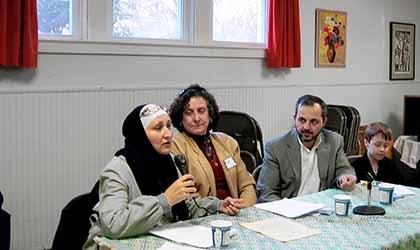By Rebecca Henely
About 30 Humanistic Jews met at the Unitarian Universalist Congregation in Flushing to ask two Muslims about their beliefs and their place in America at an event Saturday run by the Brooklyn-based Dialogue Project.
“I thought it was very important and provocative,” said Edward Klein, leader of the Queens Community for Cultural Judaism, which hosted The Dialogue Project.
The Dialogue Project is the brainchild of Brooklyn resident Marcia Kannry. A Jewish woman who once lived in Israel, Kannry created The Dialogue Project in 2001 to foster understanding across religious lines. She has recently been expanding the program into Queens.
Saturday’s dialogue was held at the Unitarian Universalist Congregation at 147-54 Ash Ave. Klein said the Queens Community for Cultural Judaism rents space from the congregation for their meetings.
In the dialogues, individuals, often of different backgrounds, speak without interruption under a time limit while the other person listens without comment. Speakers are supposed to make statements based on using the word “I” and not trying to speak for a group.
“In our dialogues, we emphasize listening, and we emphasize speaking from the ‘I,’” Kannry said.
Kannry was the moderator for speakers Haifa Bint-Kadi, a Palestinian-American artist and a single mother from Yonkers, N.Y., and Ali Salhab, a teacher and administrator at the Muslim Andalusia School of the Muslim American Society of Upper New York in Yonkers. In the dialogues, Kannry encouraged those in the audience to ask questions, even if they were difficult.
“We need to get really fine and parse out our legitimate concerns vs. what is Islamophobia and what is anti-Semitism,” Kannry said.
During the dialogues, some of the audience members — many of whom were secular types of Jews called Humanistic Jews — explained how they often had to change their first or last names to fit in with their Christian neighbors. Salhab said many Muslims have been making similar changes to their names, such as calling themselves “Mo” if their name is “Mohammed.”
“They are trying to ‘lubricate’ their names in a way to make them more American, more Anglo-Saxon,” Salhab said.
One woman asked Bint-Kadi how she reconciles wearing the hijab with being a feminist. Bint-Kadi said her decision to wear the hijab was actually based on the philosophy of radical feminist Andrea Dworkin, who wanted to do away with the idea that there was a masculine and feminine way to dress and that women have to dress to be beautiful or sexual.
“I am going to be about me,” Bint-Kadi said, “about my intellect, about what I have to offer the world.”
Bint-Kadi and Salhab also answered questions about the dhimmi tax, which non-Muslims living in Muslims societies once had to pay. Bint-Kadi said this tax did not treat non-Muslims as second-class citizens, was less than what Muslims had to pay to the state and exempted non-Muslims from military service.
“It’s designed to protect the People of the Book and respect their culture,” Salhab said, using the term Muslims use for Jews and Christians.
Ned Goldin, an 86-year-old resident of Queens Village, praised the event.
“One of the best meetings we ever had,” Goldin said. “And it’s healthy to create peace between Muslims and Jews. Nothing could be more healthy.”
Reach reporter Rebecca Henely by e-mail at rhenely@cnglocal.com or by phone at 718-260-4564.

































